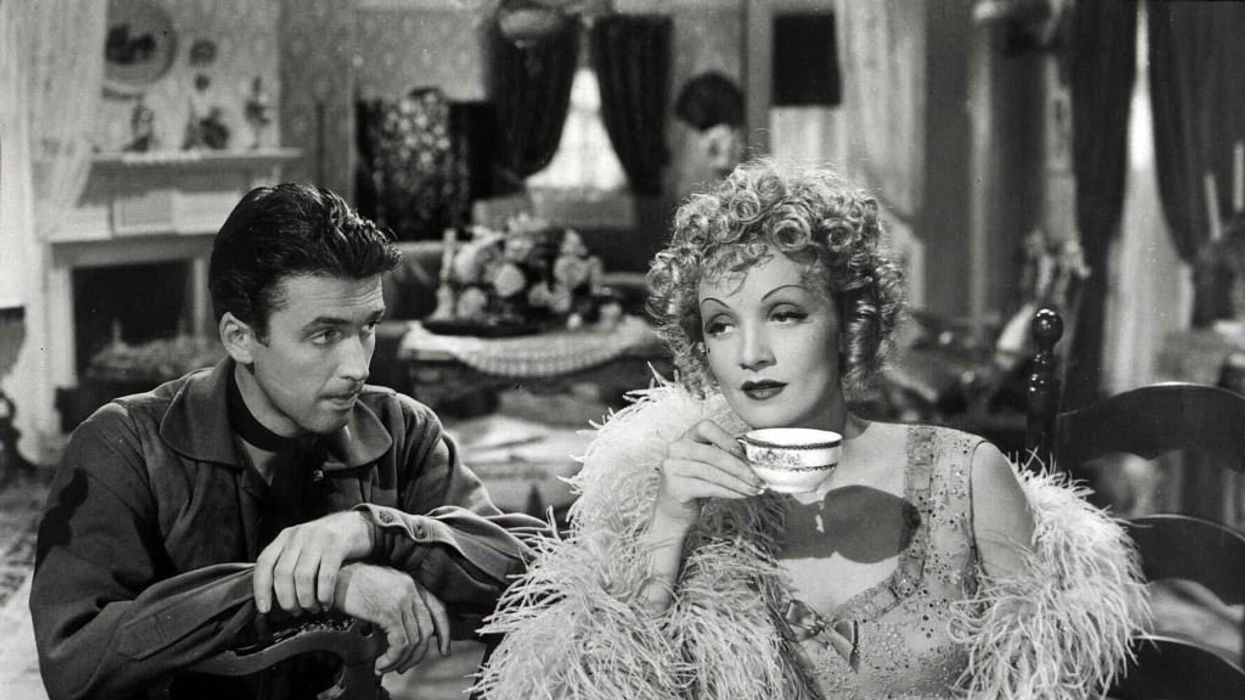
Getty Images/United Archives

Meekness reveals might as Jimmy Stewart and Marlene Dietrich battle for a town's soul.
This movie is so good that I wish I could watch it every day. As you’ve already noticed, Jimmy Stewart ranks as my favorite Western actor, neck and neck with the one and only John Wayne.
It’s hard to out-Western that opening scene, with howling madmen firing shots at a post that says “Welcome to Bottleneck.”
Immediately, we’re shoved into a town full of these crazy people — firing their revolvers indiscriminately, drunk, chasing prostitutes through the mud, packing into the Last Chance Saloon.
As the barkeep says: “This is getting monotonous.”
As these buzzards and warthogs and seductresses and murderers dance with grabbiness and slobber, anything could happen. In this savagery and chaos, deadly and lawless, we encounter Frenchy (Marlene Dietrich), the beautiful saloon singer dressed in frill and lace and feather.
She alone had the power to temper those maniacs. Her Venus energy intoxicates anyone who looks at her. She’s dominant, at times conniving, ruthless, up for grabs, and almost demonic in her sexual overflow. Even the mayor kneels at her feet.
She is pure scandal because she blinds and coaxes.
She’s feminine. She’s bold. She serves as the perfect counterexample to cynical accusations about sexism in Westerns, a belief backed only by feelings and personal insecurity.
As one character puts it, Frenchy is “the real boss of Bottleneck.” Guess who makes sure people stay drunk and loud.
Her power over the frenzied crowd is morally corrupt, of course. It appears that she is the source of Bottleneck’s homicidal lawlessness. Her followers seem to act as one, evoking the demon expelled by Jesus in the Gospel of Mark. "My name is Legion, for we are many."
Who will save this hell on earth from sinking into literal hell? The town needs an unbudging moral powerhouse, a stronghold of masculine determination.
After murdering the town sheriff, the townspeople drunkenly nominate the town drunk, Washington "Wash" Dimsdale, as his replacement. They laugh and laugh. They laugh even more when he announces that his first move as sheriff will be to call a formidable deputy. The viperous drunks hack louder.
They laugh like demons, too far degraded by evil to find sanctity, addicted to reducing any goodness or order to a joke. A howling, godawful laughter, ugly-spirited and degrading, like hyenas torturing a wounded antelope with their hideous shrieks.
The town drunk, played by the comedic mainstay Charles Winninger glares back with a sudden moral clarity as he announces “Destry will ride again!”
This breaks the crowd into total uproar, the cackling of prideful people who don’t realize that they’re about to be civilized. by none other than Jimmy Stewart himself in the guise of Thomas Jefferson "Tom" Destry Jr.
Wash's transformation from town drunk to upright lawman foreshadows the transformation of the town as a whole. Even more impressive is the masculinization of the cowardly Boris Callahan, who would be a cowboy if he hadn't been bullied out of his pants. Destry lifts him up.
If the lowest, the least, and the last can be saved, anyone can. Even Frenchy. But the painful shedding of the old self comes before redemption.
It’s no surprise that "Destry Rides Again" came out in 1939, perhaps the most important year in the history of Westerns. Until his iconic role as George Bailey in 1946, Destry was Jimmy Stewart’s favorite character. "Destry Rides Again" was also adapted for radio in 1945.
It's indicative of the townsfolk's warped understanding of authority that when Destry's stagecoach arrives, they assume the angry passenger in the big hat is their man. Instead, it's the calm, bowler hat-wearing gentleman helping the angry guy’s wife disembark while holding her parasol and birdcage.
Destry's polite yet firm response to their attempts at intimidating him is worth watching for yourself.
That, friends, is a real man in a movie that can teach men to be better men. Finally, we get a moment of silence. Finally, the jackal laughter stops as the townsfolk get their first taste of sobriety. It’s brief, but it foretells the beginning of Destry’s reign
Unlike the hacking vultures, Destry can laugh at himself. But he doesn’t laugh the same way they laugh. There’s none of the heaving, gasping, and slapping. Instead, he offers a smile — and a kind and gentle one at that. They’re all too drunk and rotten to notice that his quietness is already spreading.
“In mythic accounts, the opinion of the crowd is never subjected to criticism from a dissident minority,” writes René Girard. “Conversely, many psalms describe the narrator as being hounded by a crowd, without any provocation on his part.”
A crowd sways, though. Even Peter denied Christ under the influence of a crowd.
Frenchy is slipping. She can feel her power vanishing. Nobody else but Destry notices. So, she panics. What is she without her power?
He abides, he endures. Frenchy doubles her ruthlessness. But it shows. Her makeup smears and her lingerie sags.
Destry orders milk at the bar.
Wash, angry about Destry’s seeming unwillingness to fight demands to know what happened to him. Why did he abandon his guns?
Destry responds that guns didn’t keep his father, the famed lawman who tamed Tombstone, from getting shot in the back. He doesn't believe in guns.
Flustered, Wash shouts, “What in tarnation do you believe in?”
With the slightest change in demeanor, barely raising his voice, Destry says, “Law and order.”
“Without guns.”
Almost annoyed, “Without 'em.”
To everyone's surprise, Destry reveals himself as a gifted gunfighter.
Unlike Frenchy, Destry's rule appeals to justice, not dominance. His way is the only way to break the ever-intensifying cycle of violence. His peaceful strength wins them over.
As Destry himself puts it, “I think this ole town is going to settle into something pretty peaceful one of these days.”